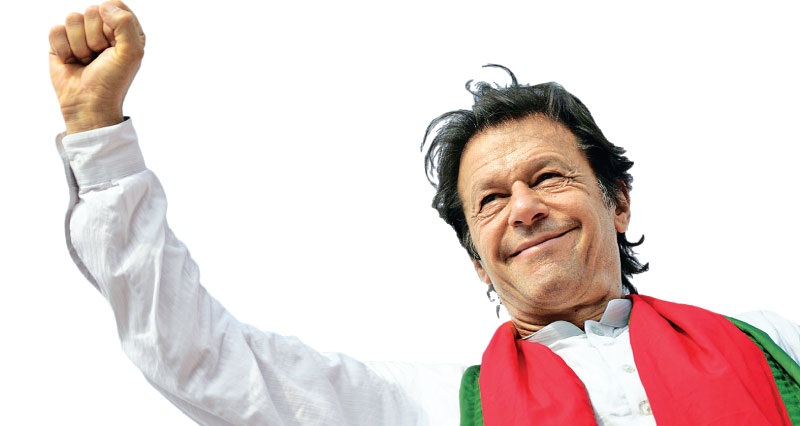Alwaght- The July 25 Pakistani parliamentary election saw a 55 percent turnout of 106 million Pakistani eligible voters. The turnout is praised as high and remarkable given the risks of terror attacks endangering the polling stations.
The results are seen by many as bearing a surprise to the Pakistani politics. Pakistan Tahreek-e-Insaf party, led by Imran Khan, took a lead as it secured 116 seats to form a government. Regarding the fact that at least 137 seats are needed to form a government, Imran Khan needs to debate a coalition with other parties and independent figures.
The significant issue was the substantial loss of the ruling party Muslim League, previously led by the former Prime Minister Nawaz Sharif. In 2013 polls, the party secured 126 seats and formed a nearly majority cabinet. Muslim League only gained only 64 seats in the recent vote. A set of issues, including Sharif’s corruption scandal, Imran Khan’s unceasing attacks, and the judiciary’s crackdown on Sharif and his relatives, have imposed a major defeat on the Muslim League.
The election has another important point: Pakistan Peoples Party, led by Bilawal Bhutto the son of the assassinated former PM Benazir Bhutto, added to its votes, moving away from the isolation it lived over the past years. The party now holds 43 seats, up from the 33 seats it gained in the previous vote. Still, Tahreek-e-Insaf was the history maker as it moved from 30 to 116 seats.
Results challenged
Only hours after the initial results come out, some party leaders such as the outgoing PM Shahbaz Sharif, rejected them, saying the results were rigged in favor of cricketer-turned-politician Imran Khan. He, however, later admitted defeat, saying his party will become opposition and pursue a legal process to prove the fraud. He reportedly contacted other losing parties to decide on a protest strategy.
Furthermore, the Muttahida Majlis-e-Amal alliance, comprised of Jamiat Ulema-e Islam led by the prominent cleric Fazl-ul-Rehman, Jamaat-e-Islami Pakistan, and Tahreek-e-Islami Pakistan, issued a statement, rejecting the vote results and an offer for a recount in some polling stations where fraud claims were made. The alliance asserted that it would not recognize the results. But analysts suggest that with consideration of reactions of Fazl-ul-Rehman, the president of Jamiat Ulema-e Islam, the alliance will finally bow to the outcome. It seems that the protesting sides will finally agree to the result and work with the leading party.
The election commission, however, has defended the health of the electoral process. The UN chief Antonio Guterres, as well as the European Union's supervising delegation, expressed approval. And messages of congratulation have poured towards the winning Imran Khan. All these will possibly play a persuasive role in calming down the post-election situation in Pakistan.
What stance has Imran Khan taken?
Regarding foreign policy, the former cricket player’s stances believes that Pakistan should get engaged in friendly relations with its neighbors, especially Iran and Afghanistan. On the heels of vote, in a televised interview he named a series of states he said Pakistan should establish a warm relationship with. He emphasized on good ties with China, Iran, and India. He also conservatively mentioned the US, saying in a bilateral relationship with Washington Islamabad’s interests should also be regarded. Islamabad’s relations with Washington over the past year experienced chill as the American President Donald Trump accused it of helping the terrorists in Afghanistan. Imran Khan especially put emphasis on China and Iran, maintaining they are Pakistan’s neighbors and ties with them should be shored up. He pointed to India, saying the two should build “peaceful” relations by starting a dialogue on Kashmir. His postures, collectively taken, exhibit independent foreign policy and a focus on the national interests.
On home policy, the victor had his words, saying he will extend his hand for cooperation with all parties, rejecting any intention to take revenge on the other parties. He appears to be mainly addressing Muslim League and Peoples Party with whom his party had maximum friction during the election campaign. Experts say that the smooth tone helps bring back stability to the nation’s politics once adopted on the ground.
Iran-Pakistan ties: Boost continues under Imran Khan
The dialogue between Islamabad and Tehran under the victory of Tahreek-e-Insaf is expected to continue. In fact, no matter who ruled Pakistan over the past years, the two neighbors’ ties remained friendly, despite some problems on borders. Islamabad leaders have always tried to keep the situation calm with Tehran to make sure no troubles erupt on the border regions. They consider completing the gas pipeline project that brings gas to the Pakistani territories from Iran. The project will ensure the cheapest price and shortest energy supply time to Pakistan. Dubbed Peace Pipeline, the project was initially meant to also supply India with gas but New Delhi withdrew as a third party under Washington pressures.
Challenges ahead of Imran Khan
Governments in Pakistan constantly undergo troubles that block their efficiency potentials. Imran Khan is no exception. Major challenges the future government will face range from massive power shortage, water shortage mainly because of lack of appropriate infrastructure, and foreign debts to currency value plunge, terrorism, and tensions with various parties. In foreign policy, Imran Khan has the difficult job of settling the problems with the US, India, and Afghanistan.



























